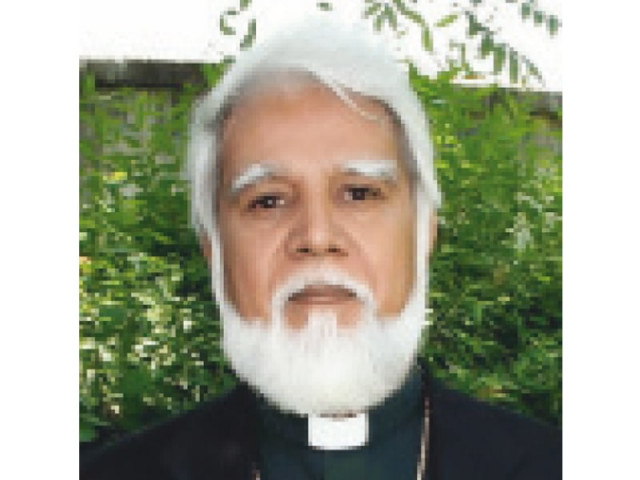New archbishop: The man designated to lead the flock in Karachi learnt a few lessons in Gojra
Bishop Coutts from Faisalabad wants to focus on interfaith harmony.

Coutts, who is currently the Bishop of Faisalabad, told The Express Tribune that there are a few months until he can take over his new assignment. He estimates about fifty to sixty days for the whole process.
Coutts, 66, believes that there is a need to proactively work on inter-religion harmony, tolerance and brotherhood to prevent tragedies. “[Certain] elements create panic and interfaith conflicts to achieve their nefarious designs,” he said.
There has been a considerable amount of emphasis placed by the Christian community on interfaith harmony in the last few years, particularly after the riots in Gojra, Punjab in 2009. The Catholic Church in Gojra and the elders in the community have led a dialogue in Gojra, where a group of extremists attacked and burned houses in the village of Korian, on allegations of blasphemy. The riots then headed to Gojra, where houses and churches in Christian Colony were attacked by a mob. Eight people were killed and 60 houses were burned down.
“I went to the site and saw that the Muslim community was also as depressed as the Christian community,” he said. “This incident was a spot on the face of humanity which cannot be removed at all.”In the Christian part of Gojra, he met an elderly Muslim who felt that he had never seen such an “absolute (act of) terrorism” in his life as people from that area had lived together with Hindus, Sikhs and Christians before Partition. “To fight man with man is very dangerous and no group should favour this practice,” Coutts added.
Blasphemy law
The bishop felt that while there was nothing wrong with the blasphemy law, it was exploited by people with ulterior motives. “Muslims along with people of other religions are also falling victim to this law,” he said. “More than 90% of cases under the blasphemy law were registered for revenge, oppression of others, extortion of property or other ulterior motives.”
He maintains that the danger of the law is that it is very easy to accuse somebody of having spoken against the Prophet Muhammad (peace be upon him), or saying or even writing something against him. “Then, the emotion takes over and that is the dangerous part,” he said. “Before you have the chance to defend yourself, everything becomes so emotional.”
Bishop Coutts also pointed out that people did not allow the law to take its course as the person facing the charges would be killed beforehand. In January 2011, the governor of Punjab Salmaan Taseer was killed by his guard who believed Taseer was an opponent of the blasphemy law. Federal Minister for Minorities Affairs Shahbaz Bhatti was assassinated two months later for the same reasons.
Coutts replaces outgoing Archbishop Evarist Pinto, but he believes that his job is more than just a higher rank. “It is not an elevation; it is a big responsibility and a very cumbersome job,” he said, adding that he would try his best to meet expectations.
Published in The Express Tribune, January 31st, 2012.



















COMMENTS
Comments are moderated and generally will be posted if they are on-topic and not abusive.
For more information, please see our Comments FAQ